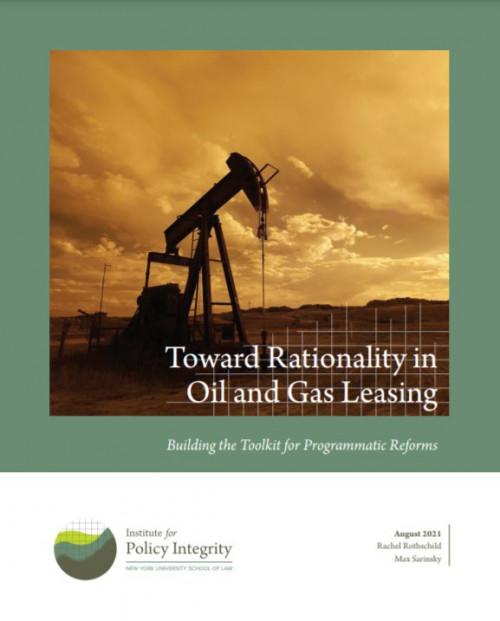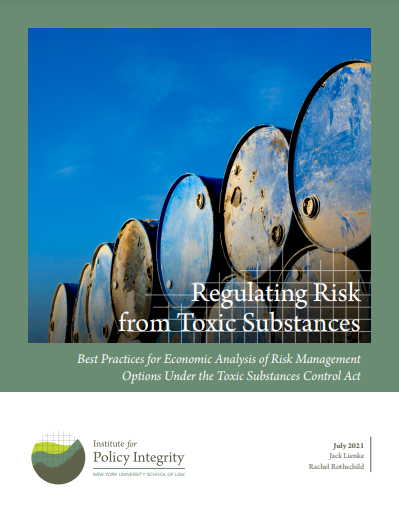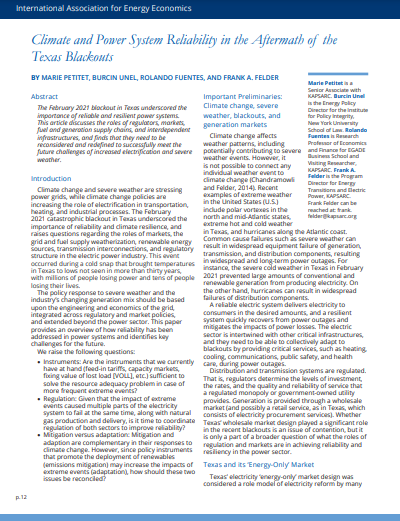-
Toward Rationality in Oil and Gas Leasing
Building the Toolkit for Programmatic Reforms
Leasing public lands and waters for fossil-fuel extraction drives a quarter of U.S. carbon dioxide emissions. Our new report offers analytic tools for federal leasing decisions to drive policies that maximize economic and environmental welfare—nationally and locally.
-
Regulating Risk from Toxic Substances
Best Practices for Economic Analysis of Risk Management Options Under the Toxic Substances Control Act
This report identifies best practices EPA should adopt to holistically assess and weigh the costs and benefits of risk management options, allowing the agency to meet its statutory obligations and best enhance public welfare.
-
Amicus Brief on Borrower Defense Rule
We filed a brief in the U.S. District Court for the Southern District of New York supporting a challenge to the Department of Education’s replacement for a 2016 regulation known as the Borrower Defense Rule. The replacement rule makes it much harder for student borrowers who have been defrauded by for-profit colleges to get their loans discharged. We later filed a brief in the Second Circuit Court of Appeals after SDNY upheld the rule.
-
Comments on Environmental Analysis of Kingston Fossil Plant
Thte Tennessee Valley Authority (TVA) published a Notice of Intent regarding the Kingston Fossil Plant, discussing different alternatives for retiring and replacing fossil fuel-powered energy generation facilities. We submitted comments encouraging TVA to better contextualize the climate impacts of each alternative using the social cost of greenhouse gases.
-
Petition for Rulemaking for the Federal Trade Commission to Ban Drip Pricing
Drip pricing is a strategy used by some sellers to lure in consumers by advertising deceptively low prices, only to reveal hidden mandatory fees after the consumer is on the verge of completing a transaction. We submitted a petition to the Federal Trade Commission formally calling for a new rule banning the use of drip pricing.
-
Comments to EPA on Withdrawal of California Preemption Waiver
The Environmental Protection Agency is reconsidering its withdrawal of a waiver of preemption for California’s zero emission vehicle mandate and greenhouse gas emission standards. We submitted comments supporting the rescission of the waiver withdrawal.
-
Comments to EPA on Proposed Phasedown of HFCs
In the Environmental Protection Agency's phasedown of HFCs under the new HFC legislation, the agency calculates a new set of social cost values for HFCs directly, using the same approach as for the social cost of methane. We submitted comments supporting EPA's methodology and encourage EPA to incorporate the SC-HFC into the IWG process going forward.
-
Comments to DOE on Energy Conservation Standards for Clothes Dryers
The Department of Energy's preliminary technical support document indicates that DOE will use the domestic-only, interim social cost of carbon dioxide, methane, and nitrous oxide values developed under the now-repealed Executive Order 13,783. We submitted comments explaining that DOE should follow the reconvened Interagency Working Group’s February 2021 recommendations.
-
Comments to OMB on Advancing Equity and Supporting Underserved Communities
In his Presidential Memorandum titled Modernizing Regulatory Review, President Biden called on OMB to identify measures to promote racial justice in the regulatory review process. We submitted comments outlining procedures and methodologies that OMB could apply to account for equity in the regulatory review process, with a focus on environmental injustice.
-
Climate and Power System Reliability in the Aftermath of the Texas Blackouts
The February 2021 blackout in Texas underscored the importance of reliable and resilient power systems. This article discusses the roles of regulators, markets, fuel and generation supply chains, and interdependent infrastructures, and finds that they need to be reconsidered and redefined to successfully meet the future challenges of increased electrification and severe weather









